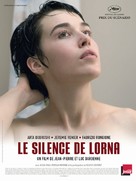Reviews provided by RottenTomatoes
A.O. Scott, New York Times: Lorna's Silence, with a narrative that turns partly on a mysterious pregnancy, evokes, subtly but unmistakably, a range of maternal biblical associations. Read more
Joe Morgenstern, Wall Street Journal: Like earlier Dardenne films, Lorna's Silence is naturalistic, yet this one, beautifully shot in 35 mm film by Alain Marcoen, achieves a poetry of bereftness. Read more
Moira MacDonald, Seattle Times: Dobroshi, a dark-browed beauty, has an arresting stillness - never smiling (except for one brief, unguarded moment with Sokol), never letting down her guard. It's a slice of a life nobody would want, and a portrait that's not easy to forget. Read more
Sam Adams, AV Club: Lorna's Silence feels like a refinement, even a repetition, of earlier themes. But the brothers are repeating themselves at such a high level that the redundancies are more than welcome. Read more
Ty Burr, Boston Globe: It's a very good film nevertheless, and in Dobroshi it has a face that passes through every conceivable shade of sorrow. Read more
J. R. Jones, Chicago Reader: Offers a damning critique of global capitalism as it works its way down to the street and poisons the most intimate human encounters. Read more
Lisa Kennedy, Denver Post: The Dardennes are masters of their brand of realist cinema. Over the years, the brothers' move from documentaries to narrative features has been handsomely rewarded. Read more
Lisa Schwarzbaum, Entertainment Weekly: From the outstanding Belgian filmmakers Luc and Jean-Pierre Dardenne (Rosetta), here's another closely observed, sociologically astute, and amazingly naturalistic drama about moral compromise as a by-product of economic need. Read more
Kevin Thomas, Los Angeles Times: Lorna's Silence is a gritty, deceptively low-key, no-fuss, no-frills movie of consistent originality and surprise in which suspense arises straight up from the heroine's evolving character. Read more
Rene Rodriguez, Miami Herald: Lorna's Silence doesn't work, but it's a beautiful misfire. Read more
Stephen Whitty, Newark Star-Ledger: This is a familiar crisis for characters in the movies of Jean-Pierre and Luc Dardenne, the Belgian brothers whose grubbily realistic films often focus on the lives of the desperate. Read more
V.A. Musetto, New York Post: The always reliable Dardenne brothers, Jean-Pierre and Luc, the Belgian poets of the underclass, outdo themselves in Lorna's Silence. Read more
Steven Rea, Philadelphia Inquirer: The Dardennes' film offers a portrait of a fragile yet determined woman set on making a home for herself in the world, even as that world unravels before her eyes. Read more
Roger Ebert, Chicago Sun-Times: What power is here. What affecting acting by Dobroshi, Renier and Marinne. Read more
Mick LaSalle, San Francisco Chronicle: It leaves the audience with neither a sense of uplift nor devastation, but, rather, with something more akin to intellectual appreciation. Read more
Dana Stevens, Slate: That's as much as you should know before going into Lorna's Silence, which combines Bressonian aesthetic rigor with Hitchcockian suspense. Read more
Colin Covert, Minneapolis Star Tribune: Belgian filmmaking brothers Jean-Pierre and Luc Dardenne have become festival darlings with rigorously minimal ethical thrillers. Read more
Calvin Wilson, St. Louis Post-Dispatch: As filmmakers, the Dardennes are more concerned with probing the causes of crime than in glamorizing it. Read more
Liam Lacey, Globe and Mail: Perhaps not quite the razor-sharp effort of their last few films, Lorna's Silence proves the Dardennes aren't afraid of looking conventional. Read more
Rick Groen, Globe and Mail: Don't look for milk and kindness in the cinematic world of the Dardennes brothers. Read more
Peter Howell, Toronto Star: In casting the previously unknown Dobroshi, the brothers approach greatness with their lean portrait of simple humanity tested by desire and driven desperate by circumstances. Read more
Dave Calhoun, Time Out: By the time 'The Silence of Lorna' reaches its quiet, unusual, reflective finale, the film feels almost spiritual in its investigation of a lost soul. Read more
Keith Uhlich, Time Out: A soul-crushing weight rests upon Lorna (Dobroshi), the Albanian-immigrant heroine of the Dardenne brothers' stunning proletarian character study. Read more
Justin Chang, Variety: Belgium's Dardenne brothers make some slight adjustments to their formula but maintain their unblinking commitment to human nature and the possibility of grace in lowly circumstances. Read more
Nick Pinkerton, Village Voice: If the Dardennes strip sentimentality from poverty, they also tend to strip subjects of their voices. Read more

